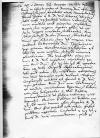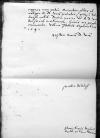List #2346
Stanisław HOZJUSZ (HOSIUS) do Ioannes DANTISCUSVilnius, 1540-09-13
| odebrano Graudenz (Grudziądz), 1540-09-30 Rękopiśmienne podstawy źródłowe:
Podstawy źródłowe - stare druki:
Publikacje:
| ||||||||||
Tekst + aparat krytyczny + komentarz Zwykły tekst Tekst + komentarz Tekst + aparat krytyczny
Reverendissimo in Christo Patri et Domino, domino
Reverendissime in Christo Pater et Domine, domine observatisssime.
Officiosissimam servitutis meae commendationem.
Binas habui a Reverendissima Dominatione Vestra litteras utrisque satis mihi respondisse videor.
Ceterum de arca nondum erat quicquam constitutum neque sine magno negotio effeci, ut eis seria magis mandata scriberentur. Non solus fortasse
Hic  LSB, Br 26, No. 2_2 negare non potui. Quantum fides et religio Reverendissima Dominatio Vestra patietur, quaeso, ut ei hidden by binding⌈[i]i hidden by binding⌉ deesse nolit.
Deum precor, ut Reverendissimam Dominationem Vestram diu servet incolumem. Cuius me gratiae hidden by binding⌈[e]e hidden by binding⌉ commendo.
LSB, Br 26, No. 2_2 negare non potui. Quantum fides et religio Reverendissima Dominatio Vestra patietur, quaeso, ut ei hidden by binding⌈[i]i hidden by binding⌉ deesse nolit.
Deum precor, ut Reverendissimam Dominationem Vestram diu servet incolumem. Cuius me gratiae hidden by binding⌈[e]e hidden by binding⌉ commendo.
Eiusdem Reverendissimae Dominationis Vestrae servitor deditissimus


